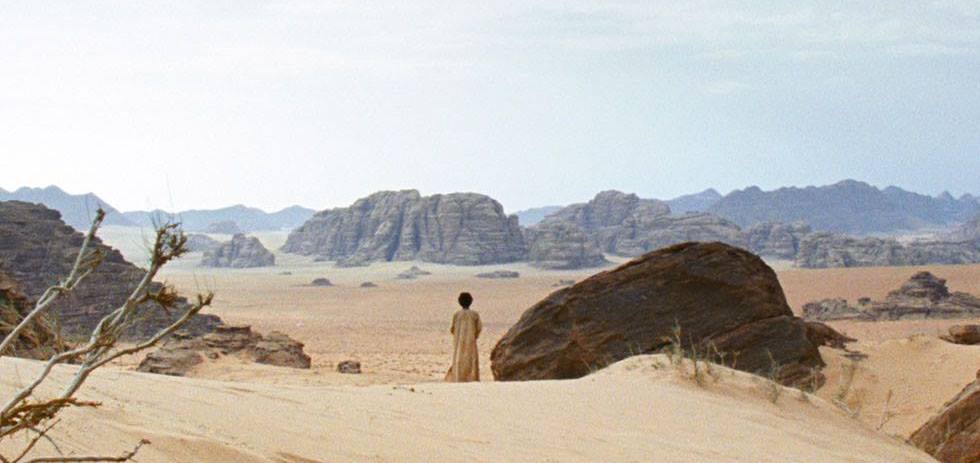
There are a number of moments in Theeb that made its solid State Theatre turnout at the Sydney Film Festival gasp in unison. This is a testament not just to the skills of a new feature director, Naji Abu Nowar, but to a narrative that pulls the rug out from our expectations without breaking linearity or focus. In going from a realistic period drama to a wilderness action adventure to a tense survival thriller, it sets up believably unsteady social environments and then disrupts them with alarming and admirable precision. Through it all, its titular boy protagonist (Jacir Eid Al-Hwietat) rapidly matures before our eyes into a worthy opponent for a world threatening to snap him up in its jaws.
That hungry world Nowar plays in is a sun-baked province of the Ottoman empire, as World War I rages and desert travellers fall prey to bandits prowling the newly-laid train tracks. Theeb has something close to a comfortable life when we meet him, with his older brother Hussein (Hussein Salameh Al-Sweilhiyeen) being an able-minded protector, nurturer and mentor. With only an opening narration from their father to call back to the pair’s parents, Nowar barrels onwards into the complication: a strapping British soldier (Jack Fox) roams into their makeshift settlement with a native companion (Hassan Mutlag Al-Maraiyeh), and the two ask to be escorted to a location deep into the expansive desert of Hijaz. Hussein agrees, since loyalty to the Bedouin tradition of hospitality outweigh skepticism about the soldier’s intentions, and his attempts to keep Theeb out of harm’s way fail when the boy runs to keep up with the party. That pivotal decision of Theeb’s makes him a part of the convoy, bearing witness to a symbolic cultural clash that then surges forward into chaos. Soon, because of his brother’s adherence to an old comprehension of the grand order, the boy must acquaint himself with a new one by making uneasy alliances and tough decisions.
Such choices are made simpler with a firearm, which is where the first genre turn in Nowar and Bassel Ghandour’s script comes in. He starts by ratcheting the tensions while the group are camped in the cut canyons of the desert ranges. The secrecy around the mission is the main frustration, exacerbated by the Englishman’s inability to speak their language and a strange package that he angrily defends from Theeb’s prying fingers. That frustration of unknowing never becomes our own because Theeb’s primary goal is to stay with his brother, and we never leave that point-of-view. With that established, Nowar then blows the doors open by staging impressive shoot-outs against bandits on the other side of wide open valleys. Their muskets blast chunks of rock and bone through crunching sound design, and the score by Jerry Lane often silences itself to make the face-offs that much more taut and engaging, though it adds warm tones of danger and unease the rest of the time.
Running in terror among the destruction is Al-Hwietat, who is an amazing find in a largely non-professional cast through his ability to mix fascination and fear in one eerily steady gaze; a credible reaction to the worsening stiuation around him. Although his fellow players do great work – particularly Hussan Mutlag, who joins Al-Hwietat in the second half to create the film’s most compelling relationship – it’s because of him that Nowar can comfortably wind proceedings down in the final third from hectic action pieces to the labours of day-by-day survival, and eventually lift Theeb’s father figures away to reveal his newly calloused demeanour.
Truthfully, nothing about this story arc could be described as innovative, but the authenticity in both physical and emotional textures is so palpable, and achieved by such clean and compelling means, that it deserves to be seen. Theeb is certainly a great call-card for a fresh director1, but it so resoundingly goes the distance for its audience that it’s a fine achievement regardless of what opportunities Nowar earns with it.
